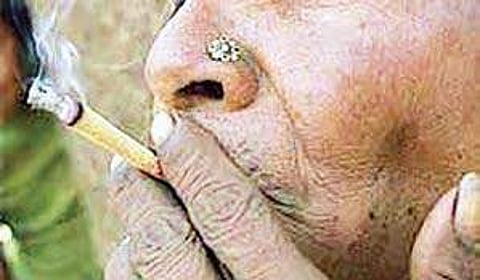

BENGALURU: Herbal bidis and cigarettes are all the rage in town. They wear a harmless hippy-dippy disguise, but in reality they could be more harmful than tobacco-based smokes. They are mostly sold online and buyers are young and old.
Manufacturers of herbal rolls claim that these, wrapped in tendu leaves, have no tobacco or nicotine and instead contain herbs such as basil, cinamon, cloves and turmeric. These rolls also come in fun flavours including chocolate and fruity.
Smokers and young adults pick them thinking this is a healthier choice, and so do people who are looking to quit their tobacco addiction. They are also used in movie shoots by actors who are not comfortable smoking regular cigarettes and also because of the smoking ban in public spaces.
But doctors do not agree that they are as harmless as they are made out to be. “The packaging is deceitful, it carries unfiltered ciagrettes or bidis that have more harmful 7,000 odd chemicals that are cancer causing and can cause havoc in your body,” says Dr. Sunil Kumar K, consulant - interventional pulmonology, Aster CMI hospital.
Whenever vegetable matter is burnt, they produce harmful chemicals like carbon monoxide and tar. “They are as harmful as tobacco cigarettes,” says Dr KS Satish, pulmonologist at Fortis Hospital. “Burning any vegetable matter lets out toxic chemicals and these enter a person’s lungs directly, particularly when they smoke herbal cigarettes.” He says that they have proven to be more harmful because users smoke them in higher numbers thinking they are healthier. “On an average these cigarettes are consumed two to three times more than normal cigarettes,” says Satish.
Deeper inhalation
The tendu leaves used as the wrap also causes smokers to inhale more deeply. “As the leaves take time to burn, the smokers have to inhale it more deeply to keep it burning,” he says. “This results in cancer-causing chemicals settling deep in their lungs.”
According to a report by the US Federal Trade Commission (FTC), herbal cigarettes produce many of the same toxins found in tobacco smoke, including tar and carbon monoxide. In April 2000, the commission ordered one of the manufacturers to add the following warning to all packages: “Herbal cigarettes are dangerous to your health. They produce tar and carbon monoxide.
Herbal Bidis are as harmful as tobacco cigarettes, because any vegetable matter that’s burned produces tar, carbon monoxide, and other toxins. When you breathe in the smoke of an herbal cigarette, you’re breathing those harmful toxins directly into your lungs. Herbal cigarettes are required by the US Federal Trade Commission (FTC) to carry warning labels saying that they’re harmful to your health.”
Psychologist Smitha Rahul does not dismiss the herbal benefits outright. She says that these bidis and cigarettes could help people gradually quit smoking, maybe in one or two months. “Most people who wants to quit smoking prefer herbal bidi to nicotine cigarettes, because they replicate the experience minus the nicotine.”
Few ‘herbal’ brands even claim that they use medicinal herbs that can fix your doshas (according to the Ayurvedic system) and others promise to clear toxins and improve immunity. There is little research to back this and this is a largely unregulated section of the market.
The prices are not prohibitive, a high-end brand could cost a user as much as a low-end tobacco cigarette. For example, you could get a pack of 100 for `700 and that is `7 for one. A high-end tobacco cigarette could be priced at `15 a roll.
Cheaper smokes
Sidharth Bedi, who is a herbal smoker, says that price is definitely a factor. “It does not break your bank,” he says, adding that this is an acquired taste. “You cannot inhale like you would with a regular cigarette. But once you get used to it, it is much more satifying.” What is worrying is that there seems to be no law regulating their sales, mostly because there is no nicotine content.
Lawyer Rajkrishore says, “I think there are no laws which particularly deals with herbal bidis and cigarettes.” Another lawyer Girish agrees: “I have not come across any law which deals with these bidis.”
This also means that these cheaper substitutes can be sold to any age group. Young adults could take a fancy to their menthol, fruity or floral flavours.